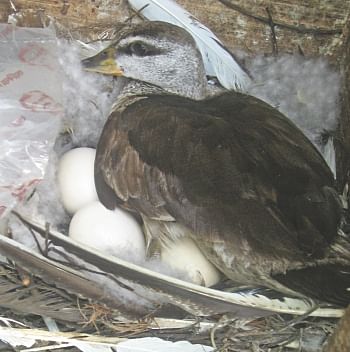Balihash back in big numbers
Balihash back in big numbers

The Baikka Beel, a wetland at Srimangal in Moulvibazar, has put on a fascinating look this winter with flocks of cotton pygmy geese, natively known as Balihash, swimming all around.
Balihash, an endangered species of waterfowls, could hardly be seen in the area even a few years ago but thanks to the awareness and sincerity of the local communities, there has been a significant increase in the number of the perching ducks now.
While visiting the wetland, this correspondent saw some boxes hidden in the bushes on the banks. He approached one and saw a female goose sitting on some bright white eggs inside the box.
The boxes have been installed under a USAID-funded project as shelters and breeding nests for the birds.
"We have installed 21 boxes on the banks of Baikka Beel, and the female geese are laying eggs in them,” said Mazharul Islam Jahangir, regional coordinator of Climate-Resilient Ecosystems and Livelihoods (CREL) project.
A male goose, in the breeding season, has a glossy blackish green crown and white head, neck and belly. It has a prominent black collar and white wing-bar, rounded head and short legs. A female goose is paler, without black collar and sometimes has only a narrow strip of white wing-bar. However, in the non-breeding season, male birds resemble females except for their white wing-bar.
They are found in the freshwater lakes, rain-fed ditches, inundated paddy fields, irrigation tanks and sometimes in village ponds.
Though Bangladesh is one of the few breeding places for the cotton pygmy geese in the world, unbridled hunting and unavailability of safe shelters threatened their existence in the country.
"Our project has been able to reduce bird hunting by 95 percent," said the official of the CREL project, which has been working to prevent hunting and indiscriminate fishing in Baikka Beel since 2006.
"Our presence here is largely contributing to the preservation of the wetland's biodiversity," said Mazharul Islam while looking at some chicks playing in the water body.